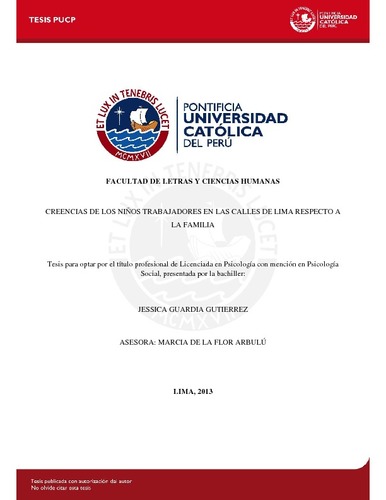| dc.contributor.advisor | Flor Arbulú, Marcia de la | es_ES |
| dc.contributor.author | Guardia Gutierrez, Jessica | es_ES |
| dc.date.accessioned | 2013-08-21T22:14:12Z | es_ES |
| dc.date.available | 2013-08-21T22:14:12Z | es_ES |
| dc.date.created | 2013 | es_ES |
| dc.date.issued | 2013-08-21 | es_ES |
| dc.identifier.uri | http://hdl.handle.net/20.500.12404/4699 | |
| dc.description.abstract | El objetivo principal del presente estudio fue explorar los conceptos y creencias respecto a la familia en los niños trabajadores en las calles de Lima. Esta investigación se centró en tres áreas: familia, condiciones de vida y trabajo en las calles, se siguió un enfoque cualitativo. Los datos fueron obtenidos de entrevistas, técnica de asociación de palabras y test del dibujo de la familia, aplicados a once niños.
Los resultados muestran que los niños tienen familias donde todos trabajan juntos como un soporte. Ellos tienen el concepto de familia como un espacio donde todos deben colaborar, brindarse amor y donde no debe haber agresión. El niño pobre asume un rol de proveedor de dinero como sus padres y trata de conservar una imagen positiva de estos ya que siente que sus padres permiten el trabajo infantil porque son pobres y necesitan dinero. Asimismo la investigación demuestra que estos niños adecúan su modo de vivir de acuerdo a sus necesidades, van a la escuela y mantienen su grupo de pares, encontrando en la calle un espacio de socialización. | es_ES |
| dc.description.abstract | The aim of this study was to explore the concepts and beliefs about the family in child street worker of the Lima city. This study focused in three areas: family, ways of living and street work, this was done following a qualitative approach. Data was obtained from interviews, word-association technique and drawing of the family, applied to eleven children.
Results suggest that the children have a family, where all work together as a support. They have the concept of family as a place where all must collaborate, give love, without aggression. The poor child assumes a role of provider of money as their parents, the child tries to maintain a positive image of their parents; they feels that their parents allow child labor because they are poor and need money. Also, the research shows that these children adapt their way of life according to your needs, go to school and maintain their peer group, the child sees the street as a space for socialization. | es_ES |
| dc.language.iso | spa | es_ES |
| dc.publisher | Pontificia Universidad Católica del Perú | es_ES |
| dc.rights | Atribución-NoComercial-SinDerivadas 2.5 Perú | * |
| dc.rights | info:eu-repo/semantics/openAccess | es_ES |
| dc.rights.uri | http://creativecommons.org/licenses/by-nc-nd/2.5/pe/ | * |
| dc.subject | Familia | es_ES |
| dc.subject | Niños--Trabajo--Perú--Lima | es_ES |
| dc.subject | Socialización en niños. | es_ES |
| dc.subject | Pobreza | es_ES |
| dc.subject | Niños--Trabajo--Investigaciones | es_ES |
| dc.title | Creencias de los niños trabajadores en las calles de Lima respecto a la familia | es_ES |
| dc.type | info:eu-repo/semantics/bachelorThesis | es_ES |
| thesis.degree.name | Licenciado en Psicología Social | es_ES |
| thesis.degree.level | Título Profesional | es_ES |
| thesis.degree.grantor | Pontificia Universidad Católica del Perú. Facultad de Letras y Ciencias Humanas. | es_ES |
| thesis.degree.discipline | Psicología Social | es_ES |
| renati.discipline | 313066 | es_ES |
| renati.level | https://purl.org/pe-repo/renati/level#tituloProfesional | es_ES |
| renati.type | http://purl.org/pe-repo/renati/type#tesis | es_ES |
| dc.publisher.country | PE | es_ES |
| dc.subject.ocde | http://purl.org/pe-repo/ocde/ford#5.01.00 | es_ES |






